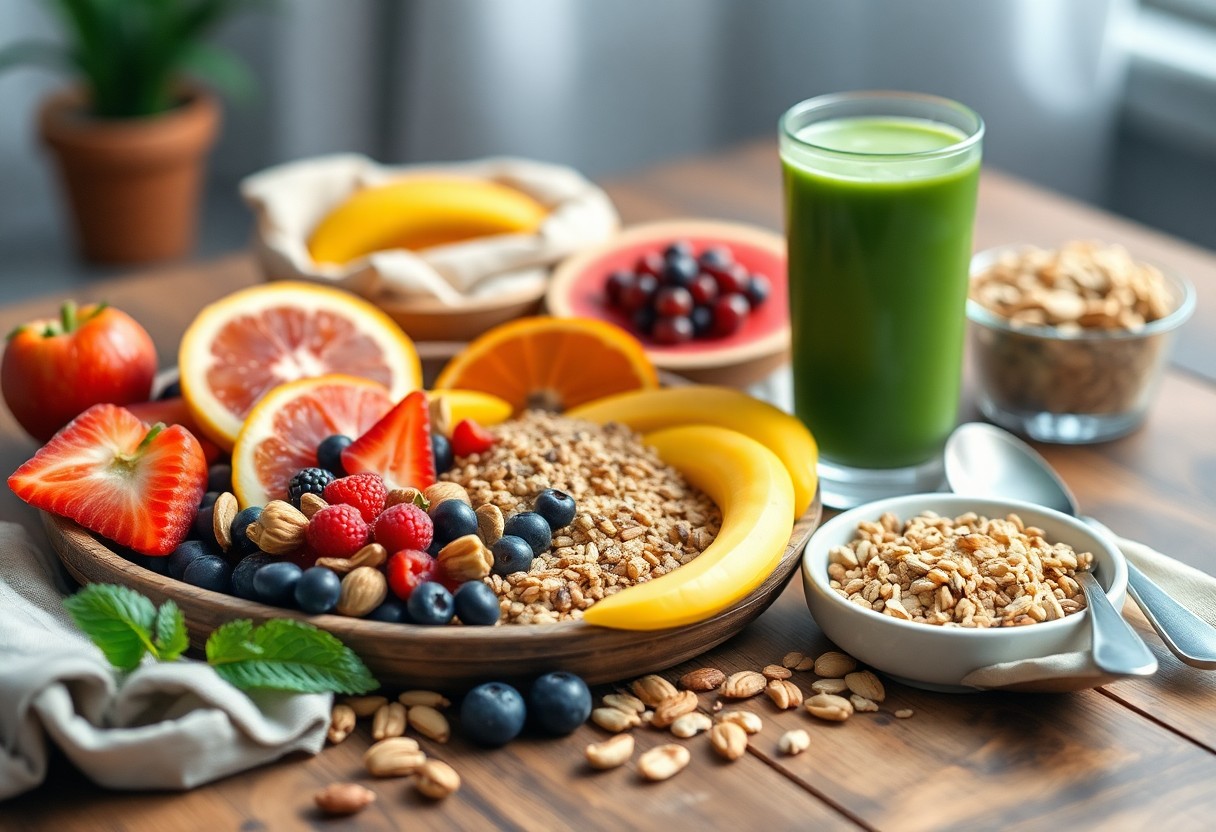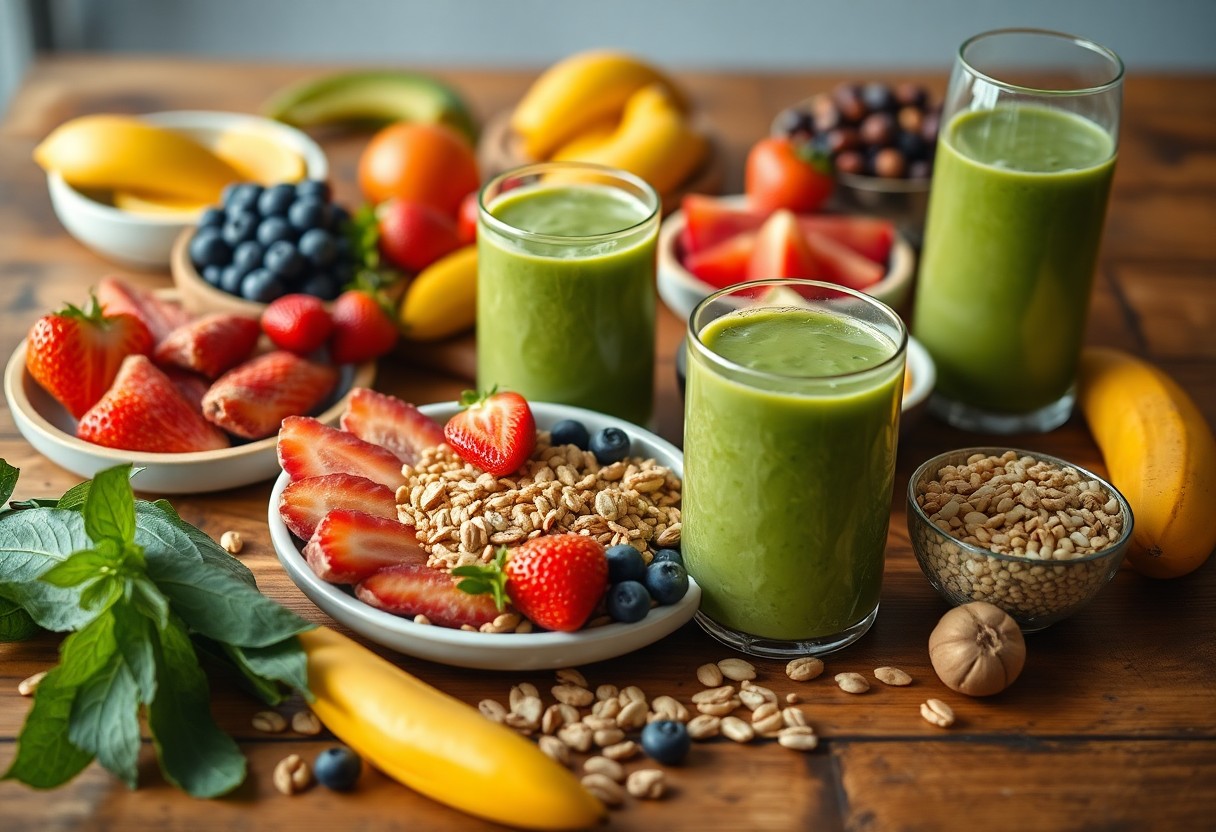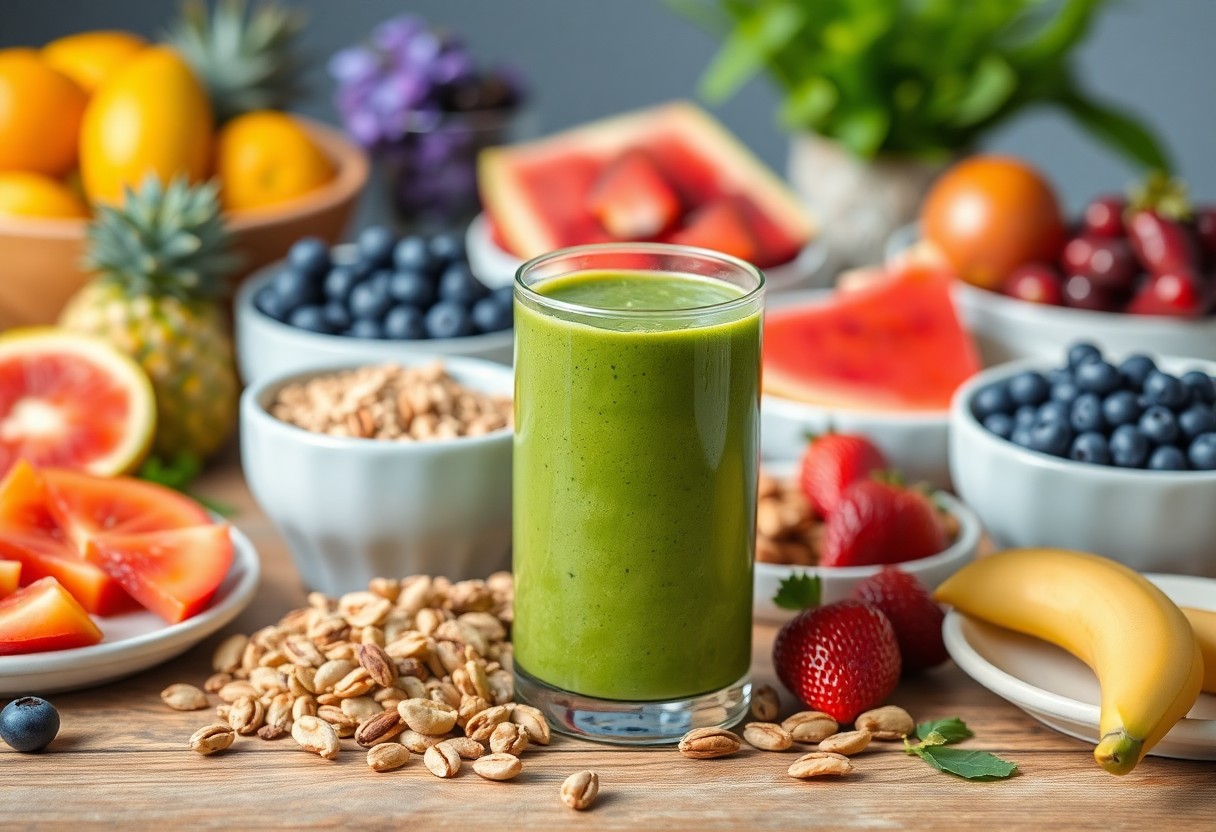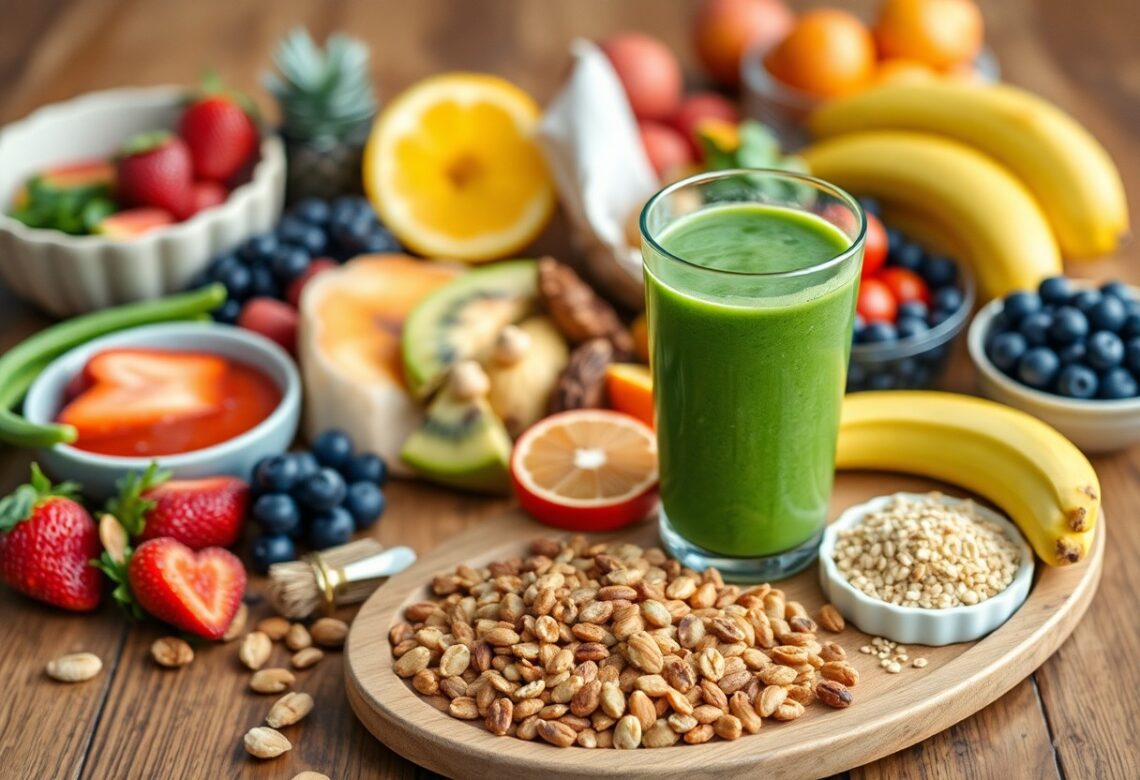With the right nutrition strategies, you can significantly enhance your energy levels throughout the day. Understanding how different foods affect your body is vital for maintaining consistent energy. In this blog, you will discover practical tips and insights that you can easily incorporate into your daily routine. Whether you’re a student juggling classes or a professional managing a busy workday, these strategies will help you stay energized and focused.
Key Takeaways:
- Include a variety of whole foods in your diet, such as fruits, vegetables, whole grains, and lean proteins, to fuel your body with necessary nutrients.
- Stay hydrated by drinking enough water throughout the day, as dehydration can lead to fatigue and decreased energy levels.
- Plan balanced meals and snacks that combine healthy carbohydrates, proteins, and fats to maintain steady energy throughout the day.

Understanding Energy Levels
Before you can optimize your energy levels, it’s important to understand what they are. Energy levels refer to how alert and energetic you feel throughout the day. They can fluctuate based on various factors, including sleep, stress, and especially nutrition. By knowing more about energy levels, you can take steps to improve them and feel your best.
What Affects Energy Levels
Across your daily life, many things can impact your energy levels. Factors like your sleep quality, physical activity, stress levels, and, importantly, your diet play significant roles. When you pay attention to these elements, you can identify what drains your energy or boosts it, helping you make better choices.
Importance of Nutrition
Importance of nutrition cannot be overstated when it comes to maintaining your energy levels. A balanced diet provides the vitamins, minerals, and nutrients your body needs to function optimally. When you fuel your body with healthy foods, you’ll likely feel more energetic and focused throughout the day.
Due to the direct link between nutrition and energy, eating a variety of whole foods is vital. Foods rich in complex carbohydrates, proteins, healthy fats, and vitamins offer sustained energy. For instance, whole grains, fruits, and vegetables release energy slowly, preventing the crashes you might experience from sugary snacks. Prioritizing nutritious meals will help you stay energized and perform better in your daily tasks.

Balanced Macronutrients
One of the best ways to optimize your energy levels is by balancing your macronutrients: proteins, carbohydrates, and fats. Each macronutrient plays a unique role in your body, providing the energy and nutrients you need to feel your best. By ensuring you have the right amounts of each macronutrient, you can help stabilize your energy throughout the day.
Proteins
Proteins are crucial for building and repairing tissues. They also help in producing enzymes and hormones. Good sources of protein include meat, dairy, nuts, and legumes. Including protein in your meals helps sustain your energy, allowing you to stay focused and active.
Carbohydrates
Proteins provide energy, but carbohydrates are your body’s primary fuel source. Carbohydrates come from fruits, vegetables, grains, and legumes. They break down into glucose, which your body uses for immediate energy. When you include the right amount of carbohydrates in your diet, you will feel more energized and less fatigued.
Indeed, carbohydrates are important for maintaining your energy levels. Complex carbohydrates, like whole grains, release energy slowly. This steady energy keeps you alert throughout the day. Be sure to include a variety of carbohydrate sources in your meals to maximize energy and nutritional benefits.
Fats
Along with proteins and carbohydrates, fats are a necessary part of your diet. They help support cell growth and protect your organs. Healthy fats come from sources like avocados, nuts, seeds, and olive oil. Incorporating these fats can help you maintain energy levels and improve overall health.
To optimize your energy levels, focus on consuming healthy fats in moderation. Omega-3 fatty acids, found in fish and flaxseeds, have anti-inflammatory properties. These can support brain function and overall well-being. Including a balanced amount of healthy fats, along with proteins and carbohydrates, creates a stable source of energy for your daily activities.
Micronutrients Matter
Now, when it comes to maintaining high energy levels, micronutrients play a vital role. These tiny nutrients, including vitamins and minerals, support your body in important ways. While macronutrients like carbs, proteins, and fats provide direct energy, the right vitamins and minerals help your body use that energy efficiently. Including a variety of colorful fruits and vegetables in your diet can help ensure you get the micronutrients your body needs to stay energized throughout the day.
Vitamins
At the core of energy production are vitamins, which help your body convert food into usable fuel. B-vitamins, for example, are imperative for making energy from carbohydrates. Vitamins C and E also support your immune system, helping you stay healthy and active. Including foods like whole grains, leafy greens, and citrus fruits can help meet your vitamin needs and keep your energy levels up.
Minerals
Micronutrients, often overlooked, include imperative minerals like iron, magnesium, and zinc that also support energy levels. These minerals play a key role in processes such as oxygen transport and muscle function. A well-balanced diet with nuts, seeds, and legumes can help you get enough of these important minerals. This ensures your body runs smoothly, reducing fatigue and boosting overall energy. Make sure you’re including a variety of mineral-rich foods in your meals.
Meal Timing and Frequency
Unlike what many people believe, when you eat can be just as important as what you eat. Meal timing and frequency play a significant role in how your body manages energy levels throughout the day. Eating at consistent intervals helps regulate your metabolism and keeps your energy steady. Skipping meals or eating at random times can lead to energy crashes or unhealthy cravings. To maximize your energy, aim for a balanced schedule that includes breakfast, lunch, dinner, and healthy snacks in between.
Eating Schedule
Frequency of meals can impact your energy. Eating smaller meals more frequently throughout the day can help maintain stable blood sugar levels. This means you should aim for three meals and two or three snacks daily. This approach ensures that your body has a constant supply of energy, preventing sluggishness that can occur during long gaps between meals.
Pre- and Post-Workout Nutrition
Above all, what you eat before and after workouts is important for maintaining energy levels. Proper pre-workout nutrition provides your body with the fuel it needs to perform at its best. After exercising, nourishing your body helps with recovery. Eating a balanced meal with carbohydrates and protein can replenish your energy and repair your muscles.
Meal timing becomes particularly important in relation to your workouts. If you eat a snack rich in carbs about 30 to 60 minutes before exercising, you’ll likely have more energy. After your workout, consuming a meal high in protein within 30 minutes helps your body recover effectively. Together, these strategies support your energy levels and keep you feeling your best.

Hydration Strategies
Once again, staying hydrated is key to maintaining your energy levels. Keeping your body well-hydrated helps improve focus and decreases fatigue. You might find it helpful to check out 9 tips to boost your energy — naturally for healthy hydration practices.
Importance of Water
On average, your body is about 60% water. This means that water plays a big role in many bodily functions. It helps in digestion, nutrient absorption, and temperature regulation. Drinking enough water can help you feel more energized and alert throughout the day.
Signs of Dehydration
Any time you feel thirsty, it can be a sign that your body needs more water. Other signs include dry mouth, fatigue, and dark yellow urine. If you notice these symptoms, it’s important to drink more fluids immediately.
Consequently, you should pay attention to how your body feels. If you’re feeling tired, it might be time to drink some water. Aim to drink at least eight 8-ounce glasses of water a day. If you’re active or in a hot climate, you may need even more. Keeping a water bottle with you can be a great reminder to stay hydrated.
Foods to Boost Energy
Your daily energy levels are greatly influenced by the foods you eat. Choosing the right foods can make a significant difference in how you feel and perform. Incorporate whole grains, lean proteins, and healthy fats into your meals to provide your body with steady energy. Foods like brown rice, chicken, and avocados release energy slowly, helping you stay alert throughout the day. Additionally, don’t underestimate the power of fruits and vegetables, which offer vitamins and minerals that support your overall health and energy.
Energy-Boosting Snacks
An effective way to maintain your energy is through smart snacking. Opt for snacks that combine protein and carbohydrates, such as Greek yogurt with fruits or almonds with whole-grain crackers. These will keep your blood sugar steady and prevent energy crashes. Choosing snacks like these can help you feel fueled and ready to tackle your tasks without feeling drained.
Superfoods for Sustained Energy
Any superfood you add to your diet can help provide sustained energy. Superfoods like quinoa, chia seeds, and berries are nutrient-rich and can enhance your vitality. They contain important vitamins and minerals that not only boost energy levels but also improve overall health. Incorporating these foods can lead to better performance during physical activities and improved focus during mental tasks.
Further exploring superfoods can reveal even more benefits. For instance, quinoa is a complete protein, meaning it contains all nine important amino acids. This makes it a fantastic choice for energizing meals or snacks. Berries, rich in antioxidants, can help reduce fatigue and keep you feeling alert. Adding these superfoods to your diet can enhance your energy levels throughout the day and make you feel more vibrant.
Summing up
To wrap up, optimizing your energy levels involves a balanced approach to nutrition. Focus on consuming whole foods like fruits, vegetables, lean proteins, and whole grains. Stay hydrated and avoid excessive sugar and processed foods. Regular meals and healthy snacks can keep your energy steady throughout the day. Additionally, listen to your body and adjust your eating habits based on how you feel. By implementing these strategies, you can maintain higher energy levels and enhance your overall well-being.
FAQ: The Best Nutrition Strategies to Optimize Energy Levels
Q: What are some foods that can help boost my energy?
A: Foods rich in complex carbohydrates, healthy fats, and protein can help boost your energy. Some great options include:
- Whole grains like brown rice and quinoa
- Fruits like bananas and berries
- Vegetables, especially leafy greens
- Nuts and seeds
- Lean proteins like chicken, fish, and legumes
Q: How often should I eat to maintain high energy levels?
A: Eating smaller meals more frequently can help keep your energy steady. Aim for 4-6 meals or snacks throughout the day. This approach helps prevent energy crashes and keeps your metabolism active.
Q: How important is hydration for maintaining energy?
A: Staying hydrated is very important for keeping your energy up. Dehydration can make you feel tired and sluggish. Make sure to drink enough water throughout the day. Aim for at least 8 cups, or more if you are active.
Q: Should I avoid sugar to keep my energy levels stable?
A: It is best to limit added sugars. While they can give you a quick energy boost, they often lead to a crash later. Instead, focus on natural sugars found in fruits and combine them with protein or healthy fats for longer-lasting energy.
Q: Can supplements help improve my energy levels?
A: Some people find that certain supplements, like vitamin B12, iron, or omega-3 fatty acids, help boost their energy. However, it’s best to talk to a healthcare professional before starting any supplements to ensure they are right for you.
Key Takeaways
- Choose foods with complex carbs, healthy fats, and lean protein for stable energy.
- Eat smaller meals and snacks throughout the day.
- Stay hydrated by drinking plenty of water.
- Limit added sugars to avoid energy crashes.
- Consult a healthcare professional before using supplements.





